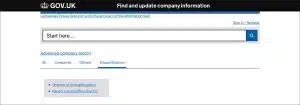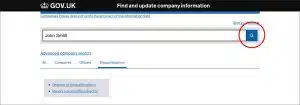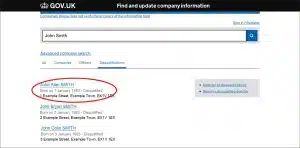 The data held by Companies House is extensive. While many are aware that they keep a record of all active and dissolved businesses, along with their associated individuals, not everyone knows about the ‘Companies House banned directors register’.
The data held by Companies House is extensive. While many are aware that they keep a record of all active and dissolved businesses, along with their associated individuals, not everyone knows about the ‘Companies House banned directors register’.
In this article, we’ll explore how to identify banned directors and discuss the importance of this register in conducting thorough due diligence. Let’s dive in
Why look for Companies House disqualified directors?
Companies House processes company documents ‘on trust’. This implies that while there are guidelines about who can be a company director, if a firm tries to appoint someone banned from holding office, Companies House will make efforts to spot them. However, they might not always succeed, resulting in the individual being listed on the Companies House directory.
Thus, if your limited company is considering adding a new director, it’s wise to consult the Companies House banned directors list to verify that prospective nominees haven’t been prohibited.
Before initiating a fresh business collaboration, be it with a vendor, associate, or client, it’s prudent to refer to the register. This ensures you steer clear of potentially troublesome businesses.
Pairing the banned directors list with insights from the company credit rating and the standard Companies House directory (which displays a firm’s present standing and checks their filing compliance) is an excellent strategy for comprehensive due diligence.
The information you can find using the disqualified register
If you conduct a search through the banned directors list and a director’s name surfaces, it should prompt you to reconsider collaborating with them. However, here’s the additional data you can obtain about the banned director:
- Complete name
- Birthdate
- Citizenship
- Residential details
- Commencement and conclusion dates of the prohibition
- Case identification number
- Title of the company they represented at the time of disqualification
- A concise explanation for their disqualification.
How to find a disqualified director
Utilising the Companies House banned directors list is complimentary, and as you’ll observe, straightforward.
To conduct a search:
- Navigate to the primary Companies House banned directors register webpage.
- Input the individual’s name and press the search icon.
- A list of names corresponding (or closely resembling) your query will be displayed. If the individual isn’t listed, that’s a positive sign, indicating they haven’t been banned. However, if their name does show up, it’s a cause for caution. Select their name to access the previously mentioned details.
How to report a disqualified director
Did you find a director who, despite being disqualified, continues to serve in that role? You have the option to notify The Insolvency Service about this.
Getting more information about why the director was disqualified
ou can refer to the standard Companies House register to gather background details about the firm the director represented at the time of their disqualification (you can also investigate any other businesses they had ties with).
What information becomes public when establishing a company? If the director was banned within the past three months from a firm located in England, Scotland, or Wales, The Insolvency Service’s online platform can provide a deeper understanding of the reasons behind their disqualification.
For disqualifications that occurred over three months ago, you can reach out to [email protected] to obtain this data.
For directors disqualified while representing a company in Northern Ireland, you can contact [email protected] to receive a comprehensive overview.
Why would someone be disqualified from being a company director?
Typically, a person is prohibited from serving as a company director if they are an ongoing bankrupt or fail to uphold the duties associated with the position.
As outlined by GOV.UK, these duties include:
- Adhering to the company’s regulations, as depicted in its articles of association.
- Maintaining company documentation and notifying of alterations.
- Submitting accounts and a Company Tax Return.
- Informing other shareholders if a company transaction could result in personal gain for them.
- Settling Corporation Tax.
A director might also face prohibition if reported to The Insolvency Service due to ‘unsuitable’ behaviour. As characterised by GOV.UK, unsuitable behaviour encompasses:
- Permitting a company to persist in its operations when it’s unable to settle its liabilities.
- Failing to maintain accurate company financial records.
- Neglecting to submit accounts and reports to Companies House.
- Not settling the company’s tax dues.
- Utilising company funds or resources for personal advantage.
Conclusion
In conclusion, searching for disqualified directors on Companies House is an essential step for businesses and individuals alike. It ensures that potential collaborators or partners uphold the highest standards of corporate governance and integrity.
By leveraging the resources provided by Companies House, one can gain insights into the track record of directors, ensuring informed decisions and safeguarding against potential risks.
This process not only promotes transparency but also reinforces the importance of due diligence in today’s business landscape.
With over three decades of experience in the business and turnaround sector, Steve Jones is one of the founders of Business Insolvency Helpline. With specialist knowledge of Insolvency, Liquidations, Administration, Pre-packs, CVA, MVL, Restructuring Advice and Company investment.



